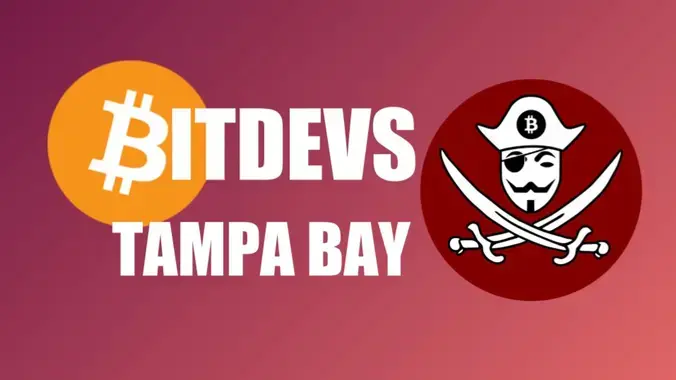BitDevs 26
From open-source chips to soft fork debates, this was a brain-bending dive into Bitcoin’s evolving guts—perfect for our education mission. Here’s the rundown on this dev-driven night!

Our latest Thursday meetup was BitDevs 26, a tech-heavy session where Tampa’s Bitcoin developers and enthusiasts geeked out over cutting-edge proposals and tools. From open-source chips to soft fork debates, this was a brain-bending dive into Bitcoin’s evolving guts—perfect for our education mission. Here’s the rundown on this dev-driven night!
Key Ideas from the Meetup
- Open-Source Security: Tropic Square’s push to open-source secure element chips could revolutionize hardware wallets, making trustless storage more transparent.
- Custody Ping Pong: A blog floated “playing pingpong” with custody—blending self-custody and third-party backups via Ark’s virtual UTXOs for flexibility and safety.
- DLC Devkit Drops: A speaker’s open-source DLC tools (like Son of Liberty) aim to simplify financial contracts on Bitcoin, boosting real-world use.
- Soft Fork Roadmap: AJ Towns’ guide laid out a practical path for soft forks like CTV and CSFS, sparking hope for Bitcoin’s next upgrade wave.
Unpacking the Meetup: BitDevs 26 Highlights
BitDevs 26 kicked off with a warm welcome from a Bitcoin Bay organizer: “We’re a 501c3 focused on education—BitDevs goes beyond 101, diving into Bitcoin’s technical nitty-gritty.” Held in Tampa, this meetup tackled a curated list from tampabitdevs.org, blending housekeeping (mempool at 2 sats/vB, block 887692) with deep dives. “We’re 10% through the subsidy era—wild, right?” they mused, noting 19.6 million BTC already mined.
First up: Tropic Square. “They’re open-sourcing secure element chips,” the speaker explained. Think Coldcard or Foundation wallets—those black-box enclaves holding private keys. “It’s not just Bitcoin—SSH, PGP keys too,” they added. Open-sourcing this tech could demystify hardware security, a big win for trustless custody and Bitcoin Bay’s adoption goals.
Next, a quirky blog: “Play Ping Pong or Not Gonna Make It.” “It’s about finding a custody middle ground,” they said, introducing Ark, a UTXO-based Layer 2. “You send BTC to an Ark provider, get virtual UTXOs, and refresh them to keep funds off-chain.” It’s Lightning-interoperable, with tap trees for spending paths—collaborative sends or unilateral exits. “If I lose my key, the provider could sweep and refund,” they speculated. A ping-pong dance between self-custody and backup—perfect for inheritance or savings.
Starknet’s roadmap popped up too. “They’re in the BitVM camp—trustless bridges between Bitcoin and Ethereum,” the speaker noted. With 99% of BTC idle, they aim to unlock its $2 trillion potential via zero-knowledge proofs. “Waiting for OPCAT for full trustlessness,” they said—bridging chains could juice up Bitcoin’s utility.
Then, a self-plug stole the show. “I’ve got an OpenTech grant for DLC Devkit,” the speaker grinned, detailing their final report. Discreet Log Contracts (DLCs) power financial apps—think futures or bets. They open-sourced three gems: Son of Liberty (a wallet dashboard for Umbrel/Start9), Earnest Oracle (Bitcoin chain data for contracts), and a Lightning proxy for communication. “Son of Liberty tracks contracts, offers markets—hash rate futures, anyone?” they pitched. Ark and Fedimint could turbocharge DLCs’ capital efficiency, cutting on-chain delays. Bitcoin Bay’s real-world focus shines here—tools for everyday BTC use.
A Lightning bug recap followed. “Pre-18.0 LND nodes were at risk,” they explained. A bad actor could crash your node mid-transaction, tricking it into misclaiming funds. “It’s instant on your phone, but HTLCs shuffle UTXOs behind the scenes,” they clarified. Package relay and zero-fee commitments (from Bitcoin 28) help mobile wallets dodge stuck closes—vital for Tampa’s Lightning adopters.
Coinscope’s research dazzled next. “They mapped influential nodes—miners like Foundry, AntPool,” the speaker said. By sending conflicting transactions to 800 nodes, they scored who swayed blocks. “Foundry hit 34 wins—aligns with hash rate,” they noted. A client’s coming to pinpoint these IPs—crucial for hashathons or fast relays.
Matt Corallo’s mempool proposal tackled MEV (miner-extracted value). “With covenants like OPCAT, AMMs could spark sandwich attacks,” they warned, citing a $220K Ethereum loss. Their fix? A marketplace for sealed transactions—miners pick profitable templates without peeking. “It’s producers vs. builders—trust shifts to the market,” they said, dodging centralization.
Finally, AJ Towns’ soft fork guide capped it. “CTV and CSFS are gaining traction,” they enthused. CTV locks outputs to templates; CSFS checks arbitrary signatures—think Noster logins. “Research, dev kits, Signet tests, industry buy-in—then activation,” they outlined. Miners signal (90% yay) or a Flag Day sets it. “We’re close—Jeremy Rubin’s GitHub lit the fuse,” they cheered. Bitcoin Bay’s education pillar thrives here—prepping us for Bitcoin’s future.
Join the Bitcoin Bay Movement!
BitDevs 26 was a tech feast—open-source chips, custody hacks, DLC tools, and soft fork dreams, all fueling our censorship-resistant vision. Catch the vibe at our Thursday meetups—next up, Mises event (Feb 22nd) and St. Pete Social (March 1st). Don’t miss Bitcoin Day Tampa and our June 14th Soiree! Join us every Thursday—grab some BTC, geek out, and let’s shape Tampa Bay’s Bitcoin future together!
